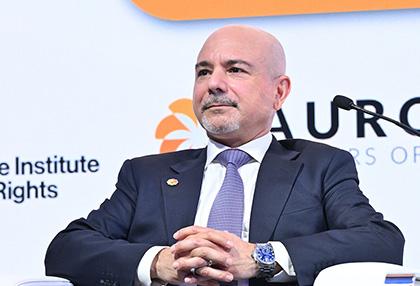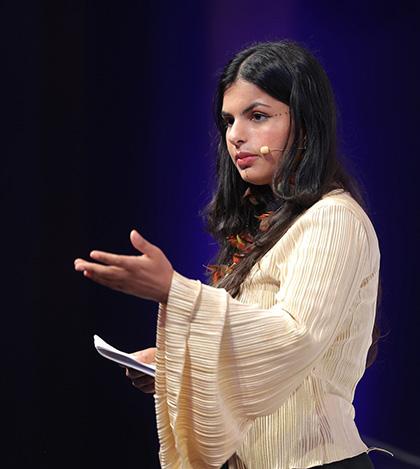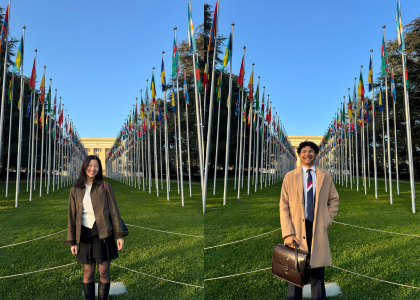
Rapid changes in the global order, finding optimism under great duress, rebuilding the international rule of law, and blazing a positive path forward were the issues at hand as thought leaders gathered at UCLA’s Luskin Conference Center earlier this month for the 2025 Human Rights and Humanitarian Forum.

Earlier in the day, Michael Waterstone, dean of UCLA Law, welcomed participants and emphasized the valuable role that each person played in carrying the cause of human rights.
“It is so fitting that this event is happening at UCLA,” he said. “As the dean of UCLA Law, I experience time and again just how important it is that we are situated here, in this global city of Los Angeles, where we have the opportunity to make a meaningful impact in so many ways, from the local to the international.”
“Our mission is to empower the next generation of human rights lawyers and leaders, and to engage research and scholarship to drive real-world impact,” said Catherine Sweetser, interim executive director of The Promise Institute. “It was inspiring to hear from young people like Ana Giménez Pozzoli, founder of Ducha de Sol, and Ayisha Siddiqa ’27, founder of the Future Generations Tribunal (and a UCLA Law student), about the environmental issues that are crucial to their generation.”
The forum included the probing discussions “Global Pulse Check,” “The Future of Human Rights,” “Modern-Day Heroes: Lessons in Resilience from Aurora Humanitarians,” “Rising Generation: Young Activists Redefining Justice and Humanitarian Action,” and “Health and Human Rights: Grassroots Approaches for Lasting Impact.”
Noubar Afeyan, cofounder and chair of the Aurora Humanitarian Initiative and founder and CEO of Flagship Pioneering, emphasized the importance of resilient action in the face of growing inhumanity around the world.
“Today, the inhumanitarians are winning,” he said. “We will all be facing choices as to when to speak up because it’s happening on our watch … . It puts even more pressure on the individuals to act both on the philanthropy side but also in the field actually saving the lives of others.”
While discussing the challenges and uncertainties facing the field, panelist Comfort Ero, president and CEO of the International Crisis Group, recounted the example of a group of Sudanese resistance fighters who decided to convert their resources into an emergency room in the midst of cruelty and humanitarian blockages.
“That in the onslaught of the violence and the horror and pain — that you would be able to transform yourself and work across sectors — that gives me hope: the ability of humanity to be innovative in a moment where we’re up against the wall,” Ero said.
“Throughout the day, we heard repeatedly from our speakers the value of empowering local actors around the world, looking for decentralized and community-led solutions,” Sweetser said. “Understanding that local shifts can have resonant impact worldwide is part of the promise of human rights and humanitarian work which makes it so worth pursuing.”

For Ellen Park '26 and Aniq Chunara '26, spending a semester in The Hague, Netherlands, was more than an ordinary academic experience, it was a transformative immersion into the hub of international justice.
The EU Constitution in the Time of War: Legal responses to Russia's Aggression against Ukraine


Join us for a conversation with Federico Fabbrini, Full Professor of European Law at the School of Law & Government of DCU to discuss his new book. Federico is also the Founding Director of the Brexit Institute and of the Dublin European Law Institute (DELI).
Embracing a comparative analytical framework, this book examines how the EU constitution has functioned in response to Russia's aggression. It scrutinizes the EU's legal reactions across five key policy areas: foreign, security, and defence policy; economic and fiscal policy; justice and home affairs; energy and industrial policy; and enlargement and reform. In doing so, it investigates whether the EU constitution has enabled the EU to respond effectively to the war, how EU treaties have been interpreted to authorize war-related actions, and whether these responses have adhered to constitutional limits.
- Wednesday, April 23, 2025
- 12:15pm-1:30pm PT
- UCLA Law, room 1327
The growing Chinese economic presence in Chile: Opinions of the Chilean Elite
Date: Tuesday, February 18, 2025
Time: 12:15pm - 1:30om
Location: Room 1420, UCLA School of Law
RSVP: https://forms.gle/WdTfPAA1Pm8bHQx36
The growth of China's economic presence in Chile has aroused considerable interest among national elites, given its impact on the country's politics and economy. Since China became Chile's main trading partner, the increase in Chinese investment has generated debate on how local sectors perceive this relationship. This study focuses on the perceptions of different categories of Chilean elites-economic, political, and academic-and how they evaluate the growing influence of Chinese capital. Although there is a general consensus that Chinese investment represents a favorable opportunity for the Chilean economy, the various elites show nuances in their perceptions. The research reveals a lack of unanimity, as each group identifies different benefits and concerns regarding foreign investment, leading to mutual blame for the lack of a clear strategy towards a country that is increasingly relevant in the local context. Through a qualitative study exploring these views, the need for a more coordinated and comprehensive approach to interacting with China emerges, which is essential to maximize economic opportunities while managing the challenges within a more dynamic international framework.
Lunch will be provided to those who RSVP by Friday, 02/14.
Co-Sponsors:
UCLA Law Int’l & Comp Law Program
UCLA Center for Chinese Studies
UCLA Latin America Institute
UCLA Asia Pacific Center